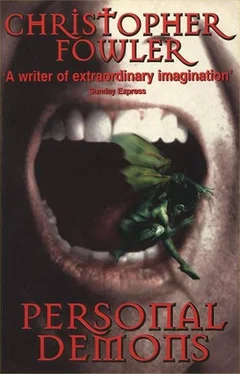Christopher Fowler - Personal Demons
Здесь есть возможность читать онлайн «Christopher Fowler - Personal Demons» весь текст электронной книги совершенно бесплатно (целиком полную версию без сокращений). В некоторых случаях можно слушать аудио, скачать через торрент в формате fb2 и присутствует краткое содержание. Жанр: Триллер, на английском языке. Описание произведения, (предисловие) а так же отзывы посетителей доступны на портале библиотеки ЛибКат.
- Название:Personal Demons
- Автор:
- Жанр:
- Год:неизвестен
- ISBN:нет данных
- Рейтинг книги:4 / 5. Голосов: 1
-
Избранное:Добавить в избранное
- Отзывы:
-
Ваша оценка:
- 80
- 1
- 2
- 3
- 4
- 5
Personal Demons: краткое содержание, описание и аннотация
Предлагаем к чтению аннотацию, описание, краткое содержание или предисловие (зависит от того, что написал сам автор книги «Personal Demons»). Если вы не нашли необходимую информацию о книге — напишите в комментариях, мы постараемся отыскать её.
A hotel offers a taboo service for its troubled clients, a vampire library attacks its readers, and a young man discovers the cutlery of the Marquis de Sade. Incarceration, incantations, romance, revenge and the end of the world occur in this collection of gothic tales.
Personal Demons — читать онлайн бесплатно полную книгу (весь текст) целиком
Ниже представлен текст книги, разбитый по страницам. Система сохранения места последней прочитанной страницы, позволяет с удобством читать онлайн бесплатно книгу «Personal Demons», без необходимости каждый раз заново искать на чём Вы остановились. Поставьте закладку, и сможете в любой момент перейти на страницу, на которой закончили чтение.
Интервал:
Закладка:
In typical London style the area hid its surprises well, for who would have thought that such an immense stadium could be tucked so invisibly behind the rows of little houses? In an equally odd arrangement, famous film stars and directors often visited the road to check on their feature prints at the nearby Metrocolor film processing labs, but the child who ventured to suggest that he just saw Mel Gibson passing the fish shop usually received a cuff about the head for lying.
So it was that Margaret moved into a damp Victorian two-floor terraced house in the shadow of a great stadium. She became pregnant twice in quick succession, and saw very little of her husband, who worked late, spent his nights drinking at Ronnie Scott's and his weekends attending football matches, with his mates. In accordance with the social etiquette of the day he never introduced his wife to his friends – the people he met at the jazz club to whom he wished to appear cool – or his mates – the people he met on the terraces to whom he wished to appear laddish.
Margaret had no interest in football. She regarded the red and white hordes who periodically trooped past her bay window as some kind of natural phenomenon, like a plague of frogs. She learned not to invite friends over for lunch on Saturday afternoons. She grew used to being segregated from fans in the Arsenal tube station, watching guiltily as they were herded into the separate tunnel of their rat-run. She became accustomed to the closed-off streets, the suspended parking bays, the colour co-ordinated families, the makeshift souvenir stalls selling booklets, flags, scarves, T-shirts and rattles, the neighbours who ran out into the road to collect the horse-droppings from the mounted police for their gardens, or who turned the fronts of their houses into tea and sandwich shops. The fans were just another vexatious and slightly mysterious part of life, like wondering why garages sell charcoal briquettes in winter or why Rolf Harris never gets any older.
So she lived with the sharp smell of frying onions and beefburgers, the nights being lit as bright as day, the packets of chips chucked over her gate, the cans of Special Brew lefton her front windowsill, the local supermarkets bumping up their prices on Saturdays, the Scots boys for whom her bedraggled front garden held eerie allure as a urinal, the spontaneous outbursts of singing, the great endless flow of generally good-natured people. She accepted it all as something that came with the house, a permanent fixture, like having a pylon in the garden.
Eventually she rather liked it. She liked watching fathers pass by with their hands on the shoulders of their sons. She had given birth to two beautiful daughters. It was no coincidence that Kenneth's interest in football and marriage ebbed from this point. Soon he became indifferent to the point of vanishing altogether, and Margaret raised her children alone. He let her keep the house, which was falling into disrepair, and moved into the more spaciously appointed Westbourne Grove residence of a sometime nightclub singer who appreciated his record collection.
And through the years Margaret watched from her window as the great red and white sea trudged back and forth. It seemed strange that such a vast cross-section of humanity could remain so placid, but there was rarely any trouble in the street. A grudge match against Tottenham Hotspur would occasionally create a small explosive pocket of anger ending with shouts and the sound of broken bottles, and on one late summer afternoon somebody slipped a hand through her open bay window to steal the handbag she had foolishly left lying on a chair, but such incidents were spaced far apart across the seasons.
The girls grew tall, developing in a curious way that mixed coarse humour with immaculate behaviour. By the age of ten they were already growing familiar with the works of Lewis Carroll and Conan Doyle, but also knew the words to popular songs like 'You're Going Home in the Back of an Ambulance' and 'My Old Man Said "Be an Arsenal Fan", I Said "Fuck Off, Bollocks, You're a Cunt".' They weren't really fans, but so much of their lives had been played out before the audience that ebbed around the house, they knew more about the Arsenal and its people than seasoned veterans.
Times remained hard for Margaret and her children. Her maintenance cheques had to be extracted with threats. She feared the future. One Saturday afternoon she sat in her front garden in the slanting autumn sunlight and cried a little. The girls were both out with friends, and she was feeling alone and saddened by the knowledge that she would one day lose them when a grinning young man called at her from the ocean of people shuffling past, 'Hey, cheer up missus, can't be that bad, come along with us and have a laugh!' and she smiled and wiped her eyes and got up, and got on.
After that, she never felt alone on Saturdays.
But she met a man, a red-headed minicab driver seven years her junior called Malcolm, and in her desperation to overlook his faults she ignored his worst; his disrespect for everything except her sexuality. After the first time he hit her, he apologised for hours and even cried, and quoted the Bible, and treated her nicely for several weeks.
The girls stayed out of his way. He was infuriated by the creativity of their swearing (something they did naturally as a consequence of where they lived) and forced them to attend services at a bleak little baptist church near his cab office in Holloway, although they only managed to go three times. It seemed to Margaret that he stared at her girls too hard, sometimes with dead-eyed hatred, and sometimes with a little too much liking. He was an unhappy man, embittered by his lot in life, yet he could be kind and supportive, and she needed him, and the affair drifted on long enough for him to be given his own front door key.
But there came a time when she wanted it back, and she wanted him out. She knew that he looked upon the three of them as godless and doomed. He nagged at Margaret to be a better mother. He complained that she was disorganised, forgetful, useless, a lousy housekeeper. He worked nights and slept days, forcing her to creep around and hold her breath each time she dropped something. He warned the girls against forming undesirable friendships after school, then enforced the warning with a curfew. He did not approve of Margaret's friends, who were Caribbean and Greek and Indian and nothing at all like the suburban couples his parents invited over for barbecues. Little by little the house in Avenell Road became a prison with limited visiting hours. During the day its atmosphere was sepulchral, colder and quieter than the street outside.
Then the new season began. The Gunners played well and ascended the league table, swelling the gate and filling the streets with more fans than ever before. There was to be a midweek charity match for a beloved retiring player. By half past six that Wednesday evening the tide of fans had risen to a deluge. Gillespie Road and Plimsoll Road were at a standstill. The floodlights had given the backstreets the brightness of Las Vegas. Malcolm strode about the living room shouting, and Margaret became frightened that he would smack her again. He was annoyed that she had allowed the girls to bring friends to the house while he was trying to sleep. She knew he took 'jellies' – tamarzepam – to sleep, and suspected that this addiction was the cause of his mood-swings, but she could not bring herself to discuss the matter with him.
'If I don't sleep I can't work, and that means no money for any of us, do you understand?'
'I don't take anything from you,' she complained. 'I provide for the girls.' To cut a long story short, she asked for the front door key back and he refused to return it. Margaret's oldest daughter was away on a school trip, and Caroline, the younger one, was hovering by the kitchen door chewing a fingernail, listening to the escalating row. When she heard the screech of furniture shifting and something – a vase? – knocked over, then silence, she ran into the room to find her mother sitting on the floor with a look of surprise on her face, as if she had just slipped over while learning to ice-skate.
Читать дальшеИнтервал:
Закладка:
Похожие книги на «Personal Demons»
Представляем Вашему вниманию похожие книги на «Personal Demons» списком для выбора. Мы отобрали схожую по названию и смыслу литературу в надежде предоставить читателям больше вариантов отыскать новые, интересные, ещё непрочитанные произведения.
Обсуждение, отзывы о книге «Personal Demons» и просто собственные мнения читателей. Оставьте ваши комментарии, напишите, что Вы думаете о произведении, его смысле или главных героях. Укажите что конкретно понравилось, а что нет, и почему Вы так считаете.












